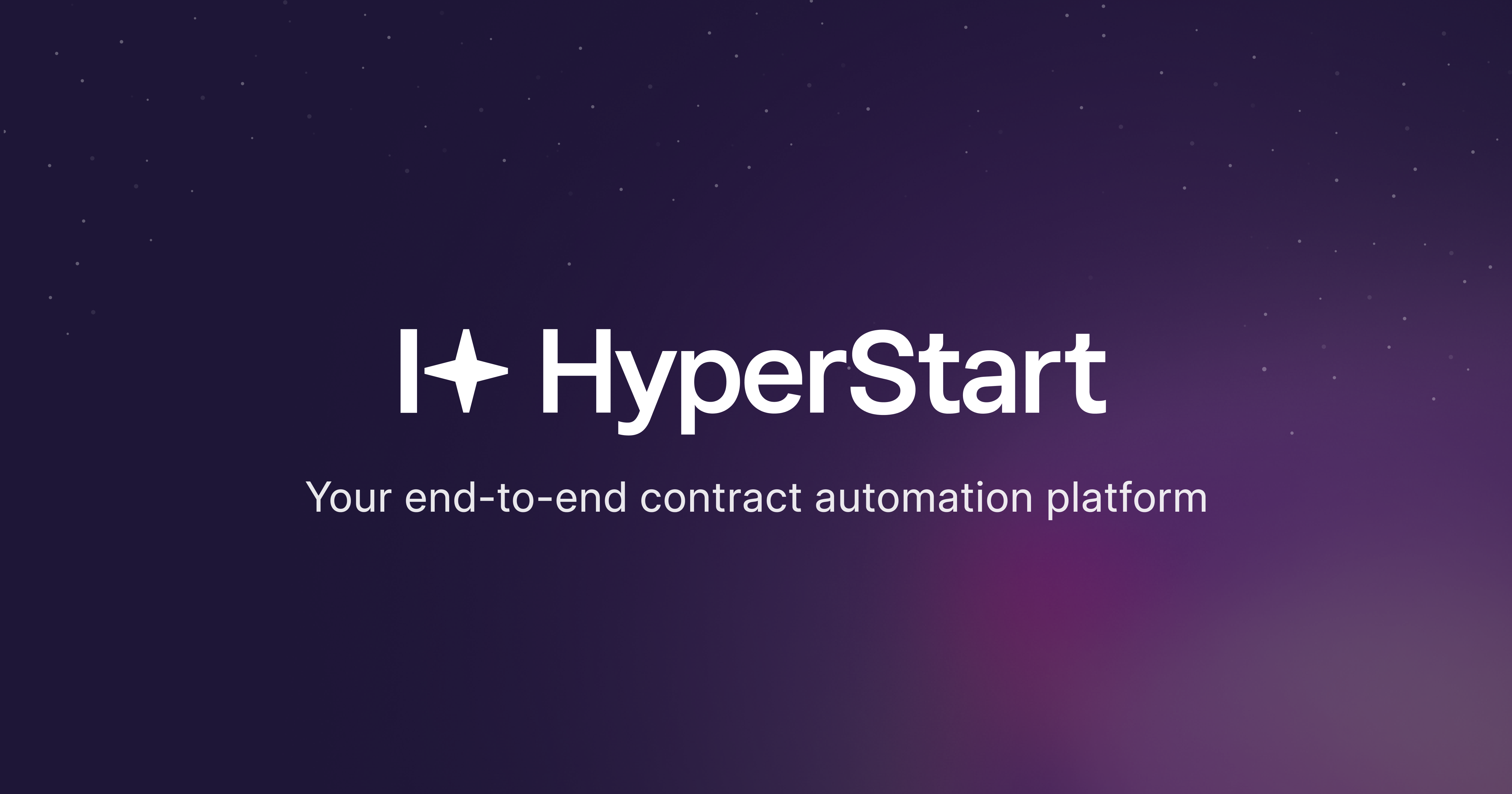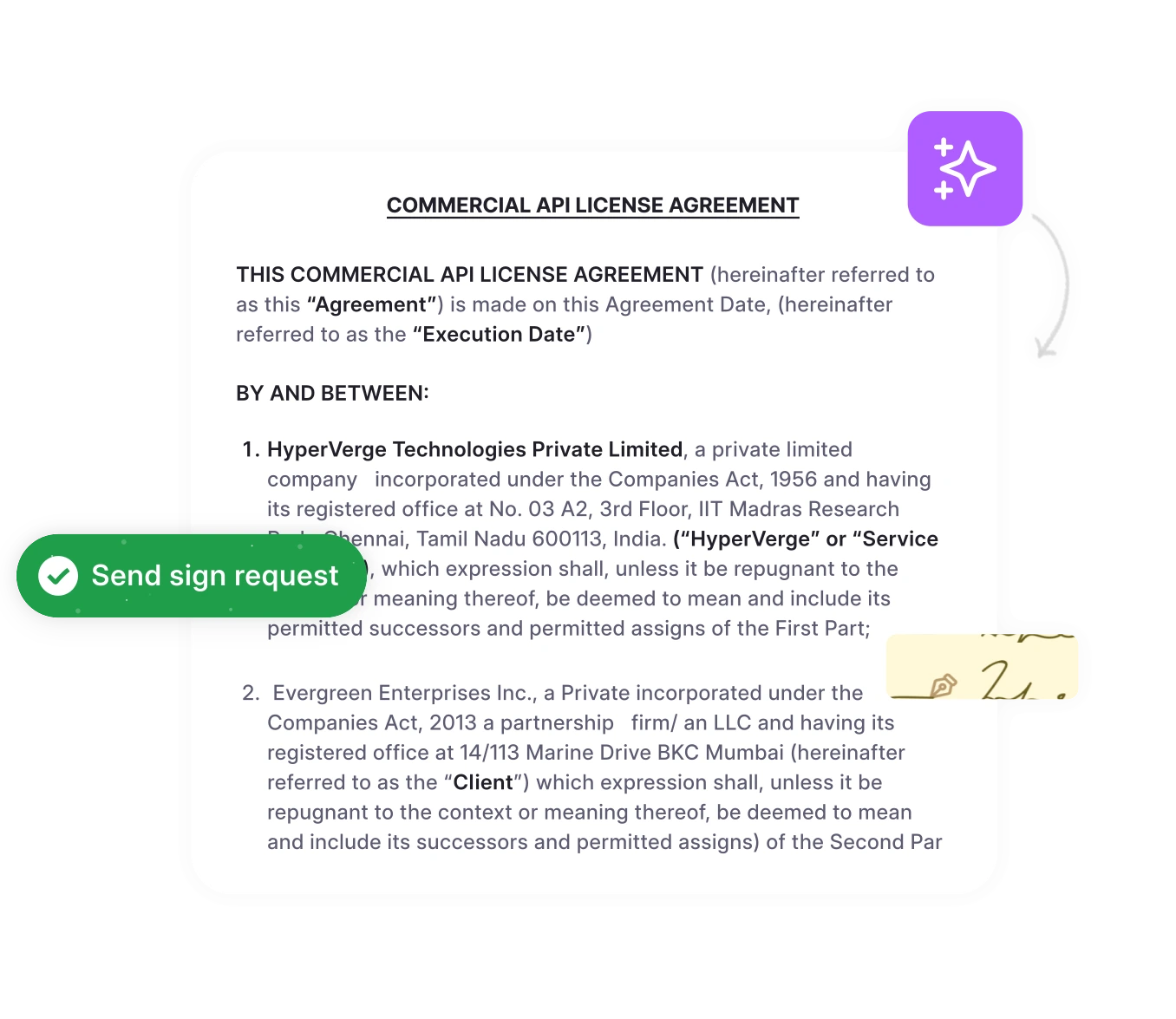A unilateral contract is a one-sided agreement where only the offeror is legally bound to fulfill their promise once the offeree completes a specific action. Unlike bilateral agreements, which require mutual promises, unilateral contracts become binding only through the performance of the party making the promise.
Common examples include insurance policies paying claims upon qualifying events, reward offers for lost items, and NDAs protecting confidential information. These contracts are legally enforceable across various industries, including insurance (with North America growing 8.2% in premiums and representing more than half of global premiums, Western Europe up 6.0%, and Asia at 4.0%, as per Allianz) and real estate.
Understanding unilateral contracts enables businesses to manage risk effectively, create compelling incentive programs, and streamline their contract management processes.
What is a unilateral contract?
A unilateral contract is a legally binding agreement where one party (the offeror) makes a promise in exchange for a specific act by another party (the offeree). The key distinction: only the offeror has a contractual obligation until the offeree performs the requested action.
Key characteristics of unilateral contracts:
- One-sided obligation- Only the offeror is bound initially
- Performance equals acceptance- Contract forms when action is completed
- No obligation to act- Offeree can choose not to perform
- Irrevocable once started- The Offeror typically can’t withdraw once performance begins
- Legally enforceable- Courts uphold completed unilateral contracts
For example, if a company offers $1,000 for finding a software bug, they’re legally obligated to pay only when someone actually finds and reports the bug. The programmer has no obligation to search for bugs. However, if they do find one, the company must compensate them.
This differs fundamentally from bilateral contracts, where both parties exchange mutual promises. In business, unilateral contracts often arise during the contract creation stage, particularly in insurance policies, employee incentive programs, and promotional contests.
This differs fundamentally from bilateral contracts, where both parties exchange mutual promises. In business, unilateral contracts are commonly found in insurance policies, employee incentive programs, and promotional contests.
A critical challenge: “The revocation rules for unilateral contracts create timing risks that most legal teams fail to monitor effectively.” Their analysis shows “the offeror may revoke the offer before the offeree’s performance begins.”
Read →
Transform Your Contract Operations?
HyperStart’s AI-powered CLM automates contract tracking and approvals, freeing your legal team from tedious administrative tasks.
Book a DemoUnilateral Contract Insurance – How Insurance Policies Work
Why Insurance Contracts Are Unilateral
Insurance contracts represent the most common type of unilateral agreement in business, generating over $5.56 billion in annual premiums. The insurance company promises to pay claims if specific events occur, while policyholders only pay premiums—they don’t promise accidents won’t happen.
Consider this structure:
- Insurer’s promise: Pay valid claims meeting policy conditions
- Policyholder’s action: Pay premiums(not a promise)
- Binding nature: Insurer must pay valid claims; policyholder can cancel anytime
This one-sided obligation protects consumers while allowing insurers to calculate risk.
Life Insurance as a Unilateral Contract
Life insurance perfectly demonstrates unilateral mechanics. A $500,000 life insurance policy works like this:
The Contract Structure:
- The insurance company promises a death benefit payment
- Policyholder pays monthly premiums ($200-$500 typically)
- Upon death, beneficiaries receive payment
- The policyholder can stop paying (canceling coverage) without breach
The insurer cannot refuse valid claims or demand additional promises. They’re bound once the policy activates, making it purely unilateral. This structure protects beneficiaries who rely on these payouts for financial security.
Example: John pays $300 monthly for a $1 million policy. He can stop paying at any time, which will end coverage. However, if he continues to make payments and passes away, MetLife must pay his beneficiaries—no exceptions for valid claims.
Health Insurance Unilateral Agreements
Health insurance operates similarly but with more frequent claim events. Your health insurer promises coverage for medical expenses meeting policy terms. You pay premiums but don’t promise to stay healthy or avoid doctors.
Key unilateral elements in health insurance:
- The insurer must cover eligible procedures
- No policyholder obligation beyond premiums
- Coverage activates upon qualifying medical events
- Policyholder chooses when to use benefits
Example: When Sarah needs surgery costing $50,000, her insurer must pay the covered portion ($45,000 after deductible) if she’s currently on premiums. Sarah never promised not to need surgery—she only paid premiums.
Managing these complex insurance contracts requires sophisticated tracking systems. Modern businesses use AI-powered contract management to monitor premium payments, track coverage terms, and automate claim validations.
Key Elements of a Valid Unilateral Contract
1. Clear Offer
The offer must specify the exact requirements for acceptance in terms of performance. Vague offers, such as “do something helpful,” won’t create binding contracts. Instead, “Find my lost dog for a $500 reward” creates clear obligations.
2. Performance as Acceptance
Unlike bilateral contracts, which require verbal acceptance, unilateral contracts require a completed action. Starting performance typically prevents revocation, but acceptance occurs only upon completion of the performance.
Example: Offering $10,000 for climbing Mount Everest—acceptance happens at the summit, not base camp.
Consideration
The performed act serves as consideration. In reward cases, finding the item provides value. For insurance, premium payments constitute consideration supporting the insurer’s conditional promise.
3. Legal Intention
Both parties must intend legal consequences. Social promises (“I’ll buy dinner if you win”) typically lack legal intention. Commercial contexts (business rewards, insurance, employment incentives) demonstrate clear legal intent.
4. Certainty of Terms
Terms must be definite enough for enforcement:
- Monetary damages: Full promised payment plus consequential damages
- Specific performance: Court orders payment when money alone is insufficient
- Restitution: Recovery of performance value if the contract fails
- Promissory estoppel: Protection when reasonable reliance caused detriment
Example: A software company offering “$5,000 for any security vulnerability discovered before December 31st” provides certainty. Developers know exactly what’s required, the reward amount, and the deadline.
Courts refuse to enforce agreements when the terms remain uncertain. Using standardized contract templates prevents disputes and ensures clear contract obligations.
Types and Examples of Unilateral Contracts
1. Reward Offers and Lost Item Notices
Classic unilateral contracts appear in everyday reward postings. “LOST CAT: $1,000 REWARD” creates binding obligations once someone returns Fluffy. The finder accepts through performance—returning the cat, not by promising to search.
Example: Amazon’s $10,000 bug bounty program represents scaled reward offers. Programmers accept by discovering and reporting vulnerabilities, not by agreeing to search.
2. Non-Disclosure Agreements (NDAs)
Unilateral NDAs protect one party’s confidential information without reciprocal obligations. Common in:
- Investment discussions- Startups sharing financials with VCs
- Employment interviews- Candidates learning proprietary processes
- Vendor evaluations- Companies revealing trade secrets
Structure: Company A shares secrets; Recipient B promises confidentiality. Company A makes no reciprocal promise, creating unilateral obligations.
Scenario: Tech startup shares algorithm details with potential investors under a unilateral NDA. Investors must maintain confidentiality, but a startup doesn’t promise anything beyond accurate information.
In many business relationships, both sides exchange sensitive information. A mutual NDA requires confidentiality obligations from both parties—for example, during mergers, joint ventures, or long-term partnerships. Unlike unilateral NDAs, mutual NDAs balance responsibilities, making them suitable when both parties disclose valuable data.
3. Real Estate Contracts
Option contracts in real estate create unilateral agreements. Property owners promise to sell at specified prices if buyers exercise their options within the specified timeframes.
Example Structure:
- Owner promises: Sell for $500,000 if the option is exercised
- Buyer pays: $10,000 for 90-day option
- Buyer’s choice: Exercise option or walk away
- Owner’s obligation: Must sell if buyer exercises
This protects buyers exploring development feasibility while compensating owners for temporarily removing their properties from the market.
Business and Commercial Examples
- Sales Commissions: “Close 10 deals this quarter, earn $50,000 bonus”- Salespeople aren’t obligated to close deals, but companies must pay if they do.
- Referral Programs: “Refer a client, receive $1,000 “- No obligation to refer, but payment guaranteed upon successful referral.
- Performance Incentives: “Reduce costs 20%, receive 10% of savings”- Employees can opt in or out; employers must pay the actual savings achieved.
Bilateral vs Unilateral Contracts – Key Differences
Understanding the distinction between bilateral and unilateral contracts helps businesses choose appropriate agreement structures:
Comparison Table
| Aspect | Unilateral Contract | Bilateral Contract |
| Obligations | One party is bound initially | Both parties are bound immediately |
| Acceptance | Through complete performance | Through mutual promises |
| Formation | Upon completion of the action | Upon agreement exchange |
| Revocation | Can’t revoke after performance starts | Requires mutual consent |
| Common Uses | Insurance, rewards, contests | Sales, employment, services |
| Risk Distribution | Offeror bears initial risk | Shared risk from the start |
When to Use Each Type
Choose Unilateral Contracts When:
Example: A Software company needs bug fixes, but can’t mandate developers to search for them. Solution: Bug bounty program (unilateral) rather than contracted debugging services (bilateral).
- What action?- Specific performance required
- What payment?- Exact compensation amount
- What timeline?- Any deadlines or conditions
- What proof?- Evidence needed for completion
Choose Bilateral Contracts When:
- Both parties need certainty
- Ongoing relationships require mutual obligations
- Services must be guaranteed
- Payment and performance need synchronization
Example: Hiring a marketing agency requires bilateral contracts—you promise payment, they promise services. Neither party wants uncertainty.
Legal Implications
Enforcement Differences:
- Unilateral: Courts enforce only after performance completion
- Bilateral: Courts enforce the agreement from the moment
Breach Consequences:
- Unilateral: Only the offeror can breach(by non-payment)
- Bilateral: Either party can breach promises
Impact: A company offering employee bonuses (unilateral) can’t sue employees who don’t pursue them. But in a supply agreement (bilateral), both parties can sue for non-performance.
Understanding these distinctions helps businesses structure agreements appropriately, avoiding disputes and ensuring enforceability.
How to Create and Manage Unilateral Contracts
Drafting Unilateral Contract Offers
Creating effective unilateral contracts requires precision. Vague terms create disputes; specific terms ensure enforcement.
Essential drafting elements:
- Specific action required – “Find and return iPhone 13 Pro, serial #ABC123”
- Exact compensation – “$500 cash,” not “generous reward”
- Clear deadlines – “By December 31, 2024, 11:59 PM EST”
- Performance proof – “Provide photographic evidence of completion”
- Payment terms – “Within 48 hours of verified completion”
Common mistakes to avoid:
- Ambiguous performance criteria
- Undefined compensation amounts
- Missing deadline specifications
- No verification process
- Unclear revocation rights
Digital Contract Management Solutions
Modern businesses managing multiple unilateral contracts need automated tracking. Manual spreadsheets can’t handle insurance policies, employee incentives, and vendor rewards simultaneously.
AI-powered benefits:
- Performance tracking- Automatic monitoring of completion criteria
- Deadline alerts- Never miss option expiration or contest deadlines
- Compliance verification- Ensure insurance policies meet regulations
- Payment automation- Trigger payments upon verified performance
- Audit trails- Document all actions for legal protection
Implementation: A tech company managing 50+ bug bounty offers, 200+ employee incentives, and 30+ insurance policies reduced contract administration time by 80% using automated CLM systems.
Revocation Rules and Timing
Unilateral contracts have unique revocation windows:
Before performance begins: Offerors can freely revoke through equal communication methods.
After performance starts, Most jurisdictions prevent revocation once substantial performance begins.
Example: Offering $10,000 to paint a house—can’t revoke when the painter is 90% complete. Courts protect performing parties from unfair withdrawal.
Best Practices:
- Set clear revocation terms upfront
- Document any revocation attempts
- Communicate through the same channels as the offer
- Consider partial performance obligations
Contract management platforms track performance status, preventing inadvertent revocations and ensuring legal compliance.
Legal Considerations and Enforcement
Are Unilateral Contracts Legally Binding?
Yes, completed unilateral contracts are fully enforceable. Courts treat them equally to bilateral agreements once performance occurs. The key: proving performance meets stated requirements.
Enforcement requirements:
- Offer clearly stated terms
- The offeree completed the specified performance
- Performance occurred within deadlines
- Consideration exists(the completed act)
Breach and Remedies
Only offerors can breach unilateral contracts—by refusing payment after performance. Available remedies include:
Example: A Software developer spends 200 hours finding a critical bug based on a $50,000 bounty offer. The company must pay even if they’ve fixed the bug differently—the developer reasonably relied on the promise.
Unilateral Mistakes in Contracts
Mistakes in unilateral contracts typically don’t void agreements unless:
- Mistake regarding the fundamental contract basis
- The other party knew of the mistake
- Enforcement would be unconscionable
Insurance example: Insurer accidentally offers $1 million coverage for $10 monthly premiums (meant $1,000). If the policyholder knew this was an error, courts might reform the contract.
Business protection: Careful drafting and review prevent costly mistakes. Using standardized templates and approval workflows reduces error risks.
In-house legal experience as General Counsel, Corporate Secretary, and Chief Compliance Officer of Marketo, Inc., Sabre Corporation (NASDAQ: SABR)
Section 1 of the Sherman Act prohibits agreements that unreasonably restrain trade, requiring both an offer and acceptance between parties. Companies may issue market signals—like press releases, earnings calls, or social media posts—but proving that competitors accepted the signal is complex if their actions are independently economically motivated.
Courts analyze violations using per se rules for obvious anticompetitive acts (e.g., price fixing) or the rule of reason for case-by-case assessment. Both horizontal and vertical agreements are covered. The key point: even unilateral communications can carry legal risk, but proving acceptance by another party is challenging.
Read →
Industry-Specific Applications
Technology and Software
Tech companies extensively use unilateral contracts for:
- Bug bounty programs- Microsoft pays up to $250,000 for critical vulnerabilities
- Open-source contributions- Rewards for code improvements
- Beta testing incentives- Payments for finding software issues
- API development contests- Prizes for best integrations
Healthcare and Medical
Healthcare organizations employ unilateral agreements for:
- Clinical trial participation- Compensation upon study completion
- Patient referral rewards- Payments for successful referrals(where legal)
- Quality improvement bonuses- Staff incentives for metric achievements
- Research grants- Funding upon milestone completion
Financial Services
Financial institutions utilize unilateral contracts through:
- Credit card rewards- Cash back on qualifying purchases
- Account opening bonuses- Payments for meeting deposit requirements
- Mortgage rate locks- Options to secure interest rates
- Investment performance fees- Bonuses for exceeding benchmarks
Common Thread: Each industry utilizes unilateral contracts to incentivize specific behaviors without requiring mandatory participation. This flexibility makes them ideal for performance-based arrangements.
Management Challenge: Tracking hundreds of conditional obligations across departments requires sophisticated contract management systems. Manual tracking leads to missed payments, compliance failures, and legal disputes.
Streamline Contract Workflows
Stop wasting hours on manual tracking. HyperStart automates approvals, reminders, and signature workflows.
Book a DemoHow HyperStart Simplifies Unilateral Contract Management
Unilateral contracts power essential business operations—from million-dollar insurance policies to employee incentive programs. Understanding their one-sided nature, performance-based acceptance, and revocation rules ensures legal compliance and operational efficiency.
With HyperStart- an AI-powered CLM platform, businesses eliminate the risks of manual tracking and compliance gaps. Our solution automates performance monitoring, sends real-time deadline alerts, and ensures payment obligations are met without errors.
Key takeaways:
- Only offerors are initially bound
- Performance equals acceptance
- Common in insurance, rewards, and incentives
- Fully enforceable once completed
- Require precise drafting and tracking
Managing dozens or hundreds of unilateral contracts manually can lead to missed obligations, compliance failures, and lost opportunities. Modern businesses need automated solutions to track performance milestones, manage deadlines, and ensure payment obligations.











